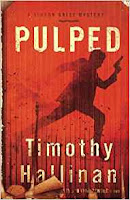Mike Brooks was born in Ipswich, Suffolk and moved to Nottingham when he was 18 to go to university. He’s stayed there ever since, and now lives with his wife,

two cats, two snakes and a collection of tropical fish. He is the author of the
Keiko novels, sci-fi adventures that follow the escapades of those crewing the spaceship of the same name;
Dark Run is the first book in the series,
Dark Sky the second.
When not writing, Brooks works for a homelessness charity, plays guitar and sings in a punk band, watches football (soccer), MMA and nature/science documentaries, goes walking in the Peak District or other areas of splendid scenery, and DJs wherever anyone will tolerate him.
Recently I asked Brooks about what he was reading. His reply:
Anyone who’s read anything like this written by me will probably be aware that Tad Williams’ Memory, Sorrow and Thorn trilogy  was a huge influence on me. As a result, I was incredibly excited at the announcement that he was going back to that world, and I gleefully devoured The Heart Of What Was Lost earlier this year. I have to admit that it took a little while to settle – the start of it seemed a little stilted, as though he wasn’t quite comfortable back in Osten Ard yet – but it smoothed out and I ended up enjoying it a lot. He’s excellent at evoking the timeless, alien nature of the non-human beings he writes about, and it gave a wonderful glimpse into the intricacies of Norn society. I’ll be sure to get The Witchwood Crown, but there’s other stuff I need to read first…
was a huge influence on me. As a result, I was incredibly excited at the announcement that he was going back to that world, and I gleefully devoured The Heart Of What Was Lost earlier this year. I have to admit that it took a little while to settle – the start of it seemed a little stilted, as though he wasn’t quite comfortable back in Osten Ard yet – but it smoothed out and I ended up enjoying it a lot. He’s excellent at evoking the timeless, alien nature of the non-human beings he writes about, and it gave a wonderful glimpse into the intricacies of Norn society. I’ll be sure to get The Witchwood Crown, but there’s other stuff I need to read first…
More recently I read The Vagrant by Peter Newman, which was fascinating and compelling and weird and a bit disgusting, all in relatively equal measure! It’s a sort of post-apocalyptic  supernatural sci-fi setting, a bit like Mad Max with demons, and the most original thing I think I’ve read for quite a while. Despite the generalised unpleasantness of the setting – or perhaps because of it – Newman manages to focus on occasional moments of beauty and purity, and they ring out all the more as a result. Also, the goat’s brilliant.
supernatural sci-fi setting, a bit like Mad Max with demons, and the most original thing I think I’ve read for quite a while. Despite the generalised unpleasantness of the setting – or perhaps because of it – Newman manages to focus on occasional moments of beauty and purity, and they ring out all the more as a result. Also, the goat’s brilliant.
At the moment I’m halfway through The Ninth Rain by Jen Williams, which doesn’t appear to get any shorter no matter how much of it you read, but that’s not a bad thing as it’s really rather good! Williams has left the world of the Copper Cat trilogy and gone full-bore into another, just as weird and wacky, with the revolting Worm People displacing various rampaging gods and insane sorcerers as the antagonists. It’s got a strong cast, with most of the main characters being female, and manages to make  some commentary on the patriarchal suppression of women (including by other women) at the same time as being a cracking fantasy adventure novel. If you like flame-spouting witches, giant bats, reimagined vampires and the lingering threat of baddies that are sort of a cross between the body snatchers and Games Workshop’s Tyranids, I highly recommend it.
some commentary on the patriarchal suppression of women (including by other women) at the same time as being a cracking fantasy adventure novel. If you like flame-spouting witches, giant bats, reimagined vampires and the lingering threat of baddies that are sort of a cross between the body snatchers and Games Workshop’s Tyranids, I highly recommend it.
My to-read pile is big and still growing, but there’s a few people whose books I owe a read: so the question is, will I choose Age Of Assassins by RJ Barker, The Court Of Broken Knives by Anna Smith Spark, Snakewood by Adrian Selby or The Malice by Peter Newman?
Visit
Mike Brooks's website.
My Book, The Movie: Dark Run.
The Page 69 Test: Dark Run.
--Marshal Zeringue
 Jardine Libaire is a graduate of Skidmore College and the University of Michigan MFA program. White Fur is her second novel. She lives in Austin, Texas.
Jardine Libaire is a graduate of Skidmore College and the University of Michigan MFA program. White Fur is her second novel. She lives in Austin, Texas.The two books of poems I just got and have been browsing through and adoring are: There Are More Beautiful Things Than Beyoncé by Morgan Parker, which is so fresh and true and razor-sharp and emotional; and A Dark Dreambox of Another Kind, The Poems of Alfred Starr Hamilton, which is a strange and mystical volume that feels like a set of prayers I can actually use.






















































